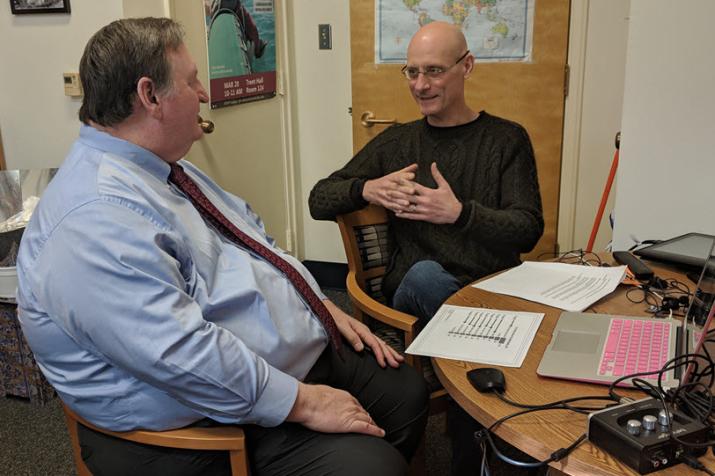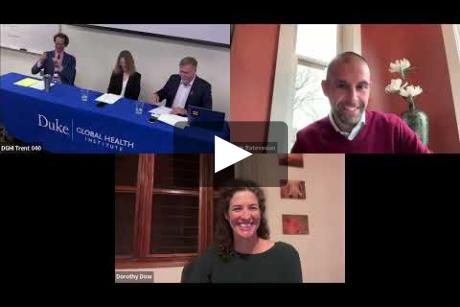
David Boyd interviews Kelly Brownell, director of the World Food Policy Center at Duke's Sanford School of Public Policy, about global nutrition for Boyd's Coursera course.
Published February 20, 2019, last updated on April 7, 2020 under Education News
David Boyd sees his Coursera course, “The Challenges of Global Health” as a public service, a way to share his passion for and wide-ranging knowledge of global health with a huge, diverse audience, at no cost to them. Boyd, the Hymowitz Family Professor of the Practice of Global Health at Duke University, admits that developing the course, first launched in 2015, was far more time-consuming and challenging than he’d anticipated. But given the rewards—including an impressive total participant enrollment of more than 21,000 students, a 4.7 star rating and personal emails from students of all ages across the globe—he says it was “absolutely worth the effort.”
Boyd has even witnessed the impact of his course firsthand, with a Duke student approaching him on campus, saying, “You don’t know me, but I came to Duke because of you,” and people stopping him—a tall, bald man with distinctive glasses—in international airports asking him, “Are you Dr. Boyd? I’m one of your students!”
We recently talked with Boyd about his course and his experience developing it. Here are some excerpts from our conversation.
DGHI: Tell us about the course.
David Boyd: “The Challenges of Global Health” is really aimed at a general audience. When we teach Duke students here on campus, we’re teaching to a more specialized group. But global health is important for everyone to understand—it impacts everyone. So the idea was to create a course that would teach anyone from a stay-at-home mom to a professional in the medical field the basics of global health, so they’d understand how so many of these health determinants fit into the big picture in all of the issues happening today, from climate change to the rise of diabetes.
We cover a little bit of everything, so we start out in the course looking at all of the determinants of health: everything from disease agents to the ways culture and social structures have an impact on health. And then we look at more particular disease burdens, like infectious disease, non-communicable disease, mental health issues, injury, violence and disaster. For each unit, we’ve put together a list of resources where people get more information. In that sense, the course can be a springboard for people who become interested in specific aspects of global health.
The course has three main components. First, there are the lectures, which I record in my office. They’re not perfectly scripted—I make mistakes, I make jokes, I give office tours [more on Boyd’s office, also known as “the Guru’s Nest,” here]. It’s very “me.” And then there are interviews with experts. In the version I’m revising right now, we’ll have interviews with 16 Duke faculty members who are all experts in various areas of global health. And lastly, it includes videos I’ve taken in different countries about specific global health issues. I’m literally taking the students around the world so that they actually not only learn about some of the challenges, but they see them firsthand—like smoking in China and diabetes in India.
The course has five modules and can be started anytime. People can generally complete it in a month or two, just watching a few hours a week.
DGHI: What motivated you to create this course?
Boyd: I see the course in some ways as a public service. Global health isn’t something that should just be for professionals to understand. Everyone has a stake in it. There’s a lot of interest among the general public in global health, and the number of people who have enrolled in the course reflect that. People understand more and more how interdependent the world is, and how the issues in one country also have an impact in others—like the fact that the air pollution produced in one country doesn’t just affect that country.
An online course is a great way to get your message out and have a broad impact. For example, the largest in-person course I’ve ever taught was 125 people. I have more people taking my Coursera course right now than I have taught and will ever teach in my entire life, and the participants run the gamut. I’ve gotten emails from a physician in Pakistan who wanted to learn more about global health, a member of the U.S. military who was interested in becoming part of some of the global health work that the U.S. military is involved in, and even elementary and middle school students who are taking the course as part of a school project. I love getting those emails. They reaffirm for me that this is a topic of great interest to people from many different walks of life.
DGHI: What are some of the challenges you’ve encountered in creating and running the course?
Boyd: There’s a lot of work involved. It takes a significant amount of time to set up the videos, create the PowerPoint slides, record the lectures until you’re comfortable with how the information comes across and just putting everything together. Once the course is running, though, it’s not a tremendous amount of work. We do periodic online chats, and sometimes I participate in the discussion boards associated with the course, but Coursera provides its own teaching assistants for each course.
Luckily for me, I’ve gotten massive amounts of support from the Duke Learning Innovation team. They’ve provided staff, technical and pedagogical advice and trouble-shooting as issues arose. I’ve also had the benefit of great research assistants, who have helped me gather, manage and structure all of the materials for the course. I’m really fortunate that I’ve had such strong support. I think having a team like this is essential to creating a high-quality Coursera course.
Another challenge relates to the content. The biggest issue we face with global health material is what I call “chasing the dragon’s tail.” By the time I finish discussing malaria, the data I’ve talked about are partially out of date. To keep the content 100 percent accurate, by the time I finish the course, I’d have to go back immediately and start changing information in it. So we’ve included a disclaimer that while the main concepts all remain valid, the data will constantly change. And we include links and resources where students can go to get updates. But of course, I do update the course every couple of years, and I’m in the process of doing that now.
Learn More:
- Check out “The Challenges of Global Health” (the updated version will be available this summer)
- Check out “Tropical Parasitology: Protozoans, Worms, Vectors and Human Diseases,” another global health course co-facilitated by another Duke Global Health Institute faculty member, John Bartlett


